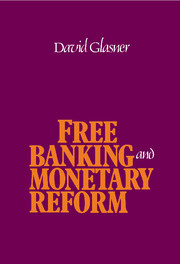Summary
My aim in writing this book has been to change some deeply entrenched attitudes about monetary institutions and monetary policy. Few tasks of the sovereign state are less controversial than its supposedly exclusive control over the monetary system within its territory. According to a well-established tradition in monetary economics, the provision of money, unlike that of most other goods and services, is somehow incompatible with the operation of competitive forces on which we ordinarily rely. The central theme on which I shall be elaborating in what follows is that monetary theory and monetary policy have mistakenly ignored the crucial role competition could (and to a surprising extent already does) have in modern monetary systems – a role scarcely different from the role it has in the supply of most other goods and services.
Until recently, this notion would have seemed almost bizarre because most economists, whatever their theoretical orientation, insisted on treating the money supply as something over which the government had virtually total control. Although everyone recognized that the private banking system was a creator of money, the behavior of banks was viewed as mechanical, not competitive. The banking system was therefore presumed to be totally subject to the manipulation of government policy makers.
- Type
- Chapter
- Information
- Free Banking and Monetary Reform , pp. ix - xiiiPublisher: Cambridge University PressPrint publication year: 1989



